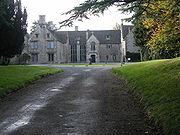
Nathaniel Stephens
Encyclopedia
Nathaniel Stephens was an English politician who sat in the House of Commons
at various times between 1628 and 1653. He supported the Parliamentarian cause in the English Civil War
.
Stephens was the son of Richard Stephens of Eastington
. He inherited Chavenage House
and enhanced the house which had been reconstructed by his father. He was elected Member of Parliament
for Gloucestershire
in 1628 and sat until 1629 when King Charles decided to rule without parliament for eleven years.
In November 1640, Stephens was re-elected MP for Gloucestershire in the Long Parliament
. He was Colonel of a regiment of horse which he raised in support of Parliament in the Civil War. In 1644 he was sent to Gloucester to secure the town and relieve Colonel Massie for other duties. In 1645 he was granted a commission to investigate the spoils of Dean Forest.
 A few months after the execution of the king, to which Stephens had acquiesced, he was struck down with a fatal sickness, which gave rise to the legend of Chavenage. Ireton was sent to visit Stephens at Christmas time to persuade him to acquiesce in the execution of the King. Stephens, known as a mild man, was wavering but it is said the Ireton sat up all night and persuaded him. In the New Year, Stephens' daughter Abigail returned home and angrily laid a curse on her father for bringing the family name into disrepute. The story goes thatafter being taken terminally ill, he never rose from his bed again.
A few months after the execution of the king, to which Stephens had acquiesced, he was struck down with a fatal sickness, which gave rise to the legend of Chavenage. Ireton was sent to visit Stephens at Christmas time to persuade him to acquiesce in the execution of the King. Stephens, known as a mild man, was wavering but it is said the Ireton sat up all night and persuaded him. In the New Year, Stephens' daughter Abigail returned home and angrily laid a curse on her father for bringing the family name into disrepute. The story goes thatafter being taken terminally ill, he never rose from his bed again.
Stephens died at the age of 71 and was buried at Eastington on 30 May 1660. Its was said that at his funeral, a hearse drew up at the door of the manor house driven by the figure of a headless man upon which the ghost of Stephens rose from the coffin and paid deep reverence.
Stephens married Catherine Beale, daughter of Robert Beale of Prior's Marston Warwickshire. .
House of Commons of England
The House of Commons of England was the lower house of the Parliament of England from its development in the 14th century to the union of England and Scotland in 1707, when it was replaced by the House of Commons of Great Britain...
at various times between 1628 and 1653. He supported the Parliamentarian cause in the English Civil War
English Civil War
The English Civil War was a series of armed conflicts and political machinations between Parliamentarians and Royalists...
.
Stephens was the son of Richard Stephens of Eastington
Eastington
Eastington may refer to:*Eastington, Devon, England*Eastington, Gloucestershire **Eastington, Cotswold**Eastington, Stroud...
. He inherited Chavenage House
Chavenage House
Chavenage House is an Elizabethan era manor house situated 2.414 km or 1.5 miles northwest of Tetbury, in the Cotswolds area of Gloucestershire, England.It is constructed of Cotswold stone, with a Cotswold stone tiled roof....
and enhanced the house which had been reconstructed by his father. He was elected Member of Parliament
Member of Parliament
A Member of Parliament is a representative of the voters to a :parliament. In many countries with bicameral parliaments, the term applies specifically to members of the lower house, as upper houses often have a different title, such as senate, and thus also have different titles for its members,...
for Gloucestershire
Gloucestershire (UK Parliament constituency)
The constituency of Gloucestershire was a UK Parliamentary constituency. After it was abolished under the 1832 Electoral Reform Act, two new constituencies, West Gloucestershire and East Gloucestershire, were created....
in 1628 and sat until 1629 when King Charles decided to rule without parliament for eleven years.
In November 1640, Stephens was re-elected MP for Gloucestershire in the Long Parliament
Long Parliament
The Long Parliament was made on 3 November 1640, following the Bishops' Wars. It received its name from the fact that through an Act of Parliament, it could only be dissolved with the agreement of the members, and those members did not agree to its dissolution until after the English Civil War and...
. He was Colonel of a regiment of horse which he raised in support of Parliament in the Civil War. In 1644 he was sent to Gloucester to secure the town and relieve Colonel Massie for other duties. In 1645 he was granted a commission to investigate the spoils of Dean Forest.

Stephens died at the age of 71 and was buried at Eastington on 30 May 1660. Its was said that at his funeral, a hearse drew up at the door of the manor house driven by the figure of a headless man upon which the ghost of Stephens rose from the coffin and paid deep reverence.
Stephens married Catherine Beale, daughter of Robert Beale of Prior's Marston Warwickshire. .

